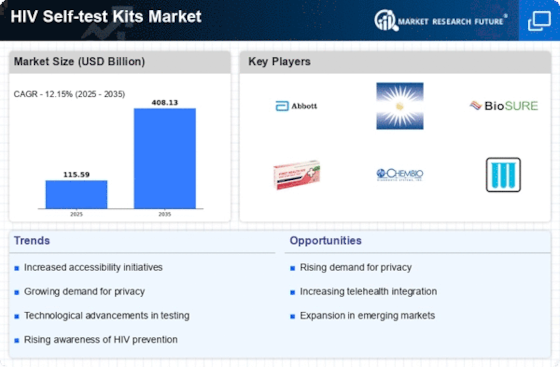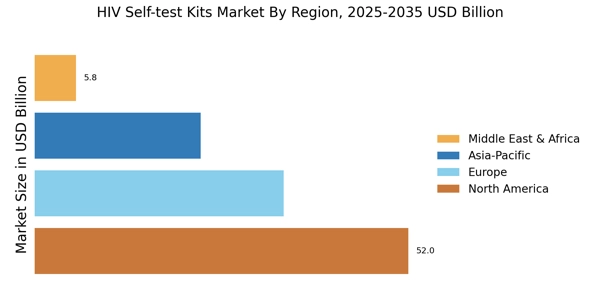Rising Awareness of HIV Testing
The increasing awareness surrounding HIV testing is a pivotal driver for the HIV Self-test Kits Market. Educational campaigns and initiatives by health organizations have contributed to a heightened understanding of the importance of early detection and treatment of HIV. As individuals become more informed about the risks associated with HIV, the demand for self-testing kits is likely to rise. Reports indicate that a significant percentage of the population remains unaware of their HIV status, which underscores the necessity for accessible testing options. This awareness is expected to propel the market forward, as more individuals seek to take control of their health through self-testing. The HIV Self-test Kits Market is thus positioned to benefit from this growing consciousness, potentially leading to increased sales and wider distribution of testing kits.
Supportive Regulatory Frameworks
Supportive regulatory frameworks are increasingly influencing the HIV Self-test Kits Market. Governments and health authorities are recognizing the importance of self-testing as a means to enhance public health outcomes. Regulatory bodies are establishing guidelines that facilitate the approval and distribution of self-test kits, ensuring they meet safety and efficacy standards. This regulatory support not only boosts consumer confidence but also encourages manufacturers to invest in the development of new products. As a result, the market is likely to witness an influx of innovative self-test kits that comply with these regulations. The positive impact of regulatory frameworks on the HIV Self-test Kits Market is evident, as they create a conducive environment for growth and accessibility.
Growing Focus on Preventive Healthcare
The growing focus on preventive healthcare is a significant driver for the HIV Self-test Kits Market. As healthcare systems shift towards preventive measures, the emphasis on early detection and management of diseases like HIV becomes paramount. Self-testing empowers individuals to take proactive steps in monitoring their health, aligning with the broader trend of preventive care. This shift is supported by various health initiatives aimed at reducing the incidence of HIV through early diagnosis. Market data suggests that as more individuals adopt preventive healthcare practices, the demand for self-test kits is expected to rise. Consequently, the HIV Self-test Kits Market stands to benefit from this trend, as it aligns with the increasing prioritization of health and wellness.
Technological Advancements in Testing Methods
Technological advancements play a crucial role in shaping the HIV Self-test Kits Market. Innovations in testing methods have led to the development of more accurate, user-friendly, and rapid self-test kits. These advancements not only enhance the reliability of results but also improve the overall user experience. For instance, the introduction of digital self-testing kits that provide instant feedback and connect users to healthcare resources is gaining traction. Market data suggests that the integration of technology in self-testing is likely to attract a broader demographic, including younger populations who are more inclined towards tech-savvy solutions. As technology continues to evolve, the HIV Self-test Kits Market is expected to expand, driven by the demand for efficient and effective testing solutions.
Increased Accessibility and Distribution Channels
Increased accessibility and diverse distribution channels are vital drivers for the HIV Self-test Kits Market. The expansion of online retail platforms and pharmacies has made self-test kits more readily available to consumers. This accessibility is crucial, particularly in regions where traditional healthcare services may be limited. Market data indicates that the rise of e-commerce has significantly contributed to the sales of self-test kits, allowing individuals to purchase them discreetly and conveniently. Furthermore, partnerships between manufacturers and healthcare providers are enhancing distribution networks, ensuring that self-test kits reach underserved populations. As accessibility improves, the HIV Self-test Kits Market is poised for growth, as more individuals are likely to utilize these testing options.

















